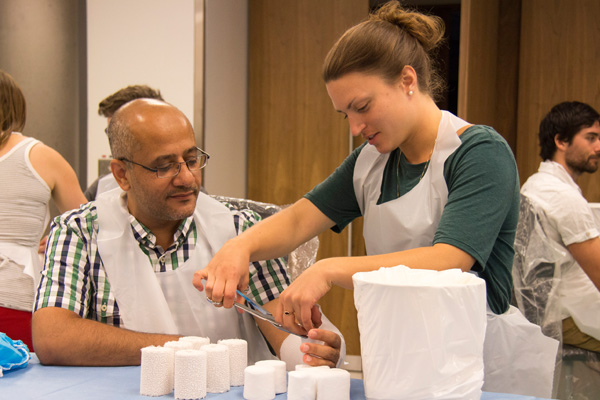A new model of medical education
January 19, 2016
Share
QueenÔÇÖs University School of Medicine announced Tuesday that it will play a leading role in the Royal College of Physicians and Surgeons of CanadaÔÇÖs initiative to transform specialty education from a time-based system to a competency-based medical education system.

Under this new model, residents are promoted once they have demonstrated competency in a given field, rather than on a set timeline. As of July 2017, all incoming QueenÔÇÖs residents will start their training using a competency-based medical education (CBME) model, making QueenÔÇÖs the first medical program to complete the transition to the new model.
ÔÇ£One of the pillars of our strategic plan is to advance new ways of training,ÔÇØ says Richard Reznick, Dean of the Faculty of Health Sciences at QueenÔÇÖs. ÔÇ£As such, the opportunity to help lead in a fundamental transformation of how we prepare the specialists of the future, is not only exciting, but exactly what we said we would do as part of our planning process.ÔÇØ
In addition to skills-based promotion, the CBME training model also calls for more frequent and meaningful assessments, ensuring that competent residents will move through training in a more individualized and efficient manner, saving valuable resources and promoting excellence in their paths to independent practice.
ÔÇ£QueenÔÇÖs institutional approach captures the hearts and minds of our entire medical school by engaging all of our educational leaders and faculty at once,ÔÇØ explains Damon Dagnone, Faculty Lead for CBME at QueenÔÇÖs. ÔÇ£We began working with our teaching hospitals on a centralized approach over 18 months ago, engaging our faculty, resident trainees, the Royal College, patients and their families, and other Canadian medical schools along the way. This is a journey of discovery we are all taking together.ÔÇØ
The Royal College mapped out a multi-year transition for all residency programs in Canada in 2014. However, in consultation with the Royal College, QueenÔÇÖs UniversityÔÇÖs School of Medicine took on a leadership role by designing and implementing a parallel accelerated path to CBME, making a commitment that all incoming QueenÔÇÖs residents will start their training using a CBME-based model by July 2017.
The universityÔÇÖs application to accelerate the transition was approved by the Royal College this past November.
ÔÇ£Here at QueenÔÇÖs we have the extraordinary educational leadership to accomplish this, in addition to an incredibly dedicated teaching faculty who are universally committed to the best education for our residents. We all share the same goal, and that is to graduate specialists who are more skilled and more knowledgeable than we might have ever imagined. ThatÔÇÖs our goal, and that is why I am so excited about our CBME initiative,ÔÇØ says Dr. Reznick.